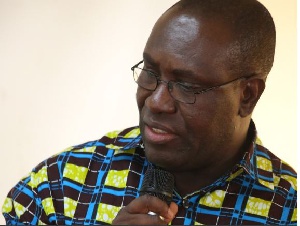The Trades Union Congress (TUC) has charged government to use the 2019 budget to reduce the rising unbearable cost of living.
The union wants government to use the budget to support private sector to complement government initiatives to create more jobs, overhaul exemption system, eliminate distortions and inequities in pay across public sector institutions, address challenges of pension, health care, housing labour administration, among others.
These are contained in TUC’s proposals for the 2019 budget and economic policies of the government submitted to the Finance Ministry.
According to the union, the first post-IMF budget should lay a very strong foundation President Akufo-Addo’s ‘Ghana Beyond Aid’ agenda by outlining concrete measures that will shift the economy away from taxes to production.
“We believe that our proposals in this submission will help reduce the widening inequality in Ghana to ensure a stable and peaceful society,”
No pensions for 10 million Ghanaians
The TUC warned that over 10 million Ghanaians will not have access to pension when they attain the retirement age of 60 years.
According to the union, eight years after the introduction of three-tier pension scheme, which was introduced in 2010, was to improve pension coverage, especially for informal economy workers, workers have not seen any credible government policy or measures towards achieving this objective.
It appealed to government to initiate some policies in the 2019 Budget toward improving coverage of pension among informal economy workers.
Unification of pensions
It said the unification of pensions deserves more attention in order to eliminate unfairness in pension/retirement benefits.
Reform of SSNIT
The union urged government to initiate reforms in the first-tier Social Security and National Insurance Trust (SSNIT) scheme to ensure efficiency in the management of the fund.
Publish findings of probe into SSNIT
TUC is also demanding the publication of results of all investigations into the affairs of SSNIT without further delay.
NPRA to pay attention to Second-tier schemes
It charged the National Pension Regulatory Authority (NPRA) to pay attention to its supervisory duties to ensure that the second-tier schemes are properly managed because in 2020 a large majority of retirees would rely on the second-tier schemes for their lump-sum benefits.
Wage increases to lag behind inflation rates
The workers union blamed the worsening cost of living on low earnings in both the public and private sectors emphasizing that earnings in the public sector have deteriorated in real terms as wage increases have continued to lag behind inflation rates.
“Similarly, the minimum wage has been fixed at approximately $2 a day in the last ten years.
“We cannot sustain growth with declining real purchasing power. One of the ways to address this challenge is to eliminate the distortions and inequities in pay across public sector institutions which the Single Spine Pay Policy has failed to address.
“Additionally, we expect bold measures to adequately protect all vulnerable workers by enforcing the national daily minimum wage,” it added.
TUC lists problems of the economy
TUC decried excessive importation of most of our basic needs, 35%tax on personal incomes of GH¢10,000 and above, the massive job losses in some key sectors of the economy, including mining, banking and maritime sectors, the frequent upward adjustment of petroleum prices, restrictions imposed by the
IMF programme on public sector pay adjustments in particular and public expenditure in general saying these all feeding into the harsh socio-economic conditions currently being experiencing in all parts of Ghana.
“The budget must spell out policies and programmes to translate the macroeconomic gains into a very significant reduction in the cost of living.
“We expect government to announce initiatives to plug the leakages in the tax system. We do not expect government to introduce new taxes.
Overhaul to eliminate exemptions
“Rather, the tax exemption system must be overhauled to eliminate exemptions for some multinational companies including those that are exploiting our natural resources,” it added.
Challenges of the private sector
TUC noted that a strong private sector offers the most sustainable solution to the unemployment challenge but there are too many constraints that are preventing the private sector to expand to absorb the rising number of job seekers.
The private sector has always complained about frustrations at the ports of entry and procedures for registration and licensing, it added.
The Union expects the Minister for Finance to announce bold initiatives in the 2019 Budget Statement to streamline the operations of its frontline agencies that often frustrate operations of domestic enterprises whether in the acquisition of permits or requests to have water and electricity connected to their premises.
“We acknowledge the various financial support programmes that government is implementing to support the growth of the private sector within the framework of the 1D1F initiative.
“The domestic private sector is clearly in need of financial support given the prevailing high lending rates.
“We urge government to complement the financial support with policy support.
“The most significant of this policy support is in the area of trade policy.
“The national trade policy is too liberal for our level of development. “Our trade policy facilitates the creation of jobs in foreign countries. “There is urgent need to reform our trade policy to align it with our employment objectives.
“The trade policy must support domestic manufacturing and discourage imports of non-essential products particularly those that can be manufactured here.
“We must make use of existing safeguards in the international trading system to support and protect domestic manufacturers from unsustainable competition” it added.
Enforcement of standards
It appealed to government to strengthen the national standards and regulatory agencies to enforce standards particularly in respect of imported items to curb illicit trade.
TUC expects government to outline concrete plans for the implementation of housing initiatives announced in the 2018 Budge.
Huge regional disparity in distribution of health personnel
It bemoaned the huge regional disparity in the distribution of health personnel in favour of urban areas. About half of all doctors are in Accra
Business News of Saturday, 20 October 2018
Source: thefinderonline.com

















